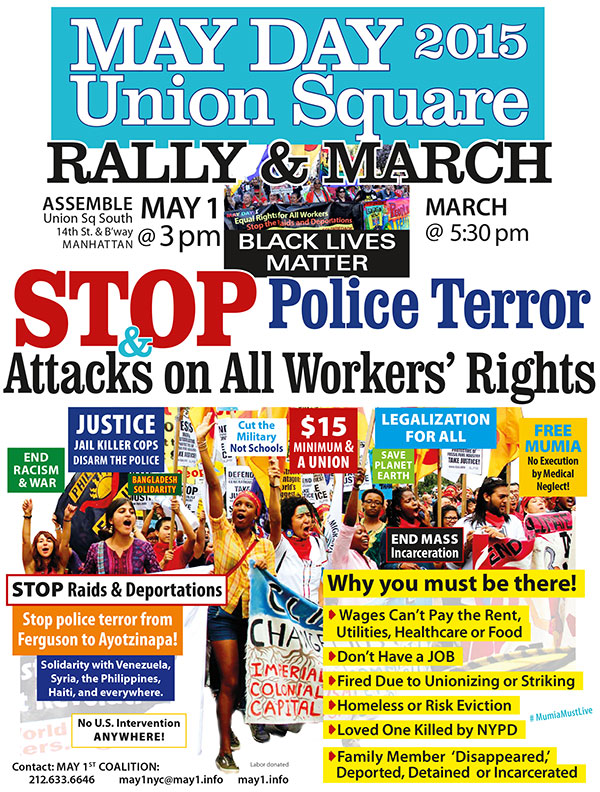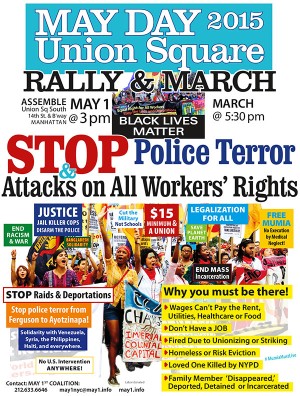



The killing of young Michael Brown by Ferguson, Mo., police on Aug. 9 and the cellphone-videoed killing of Eric Garner by New York police on Staten Island galvanized a rainbow movement, led by Black and Brown youth.
Creative and determined protests have interrupted business as usual in streets, highways, shopping malls, restaurants, everywhere. Protesters have faced tear gas and militarized SWAT units while chanting, “Hands up! Don’t shoot!” Union banners and “Fight for $15 and a union” militants hit the streets in St. Louis, but organized labor action has been missing until now, even though the police killings continue.
Walter Scott murder and labor
The New York Times printed pictures on its April 8 front page from video footage capturing the moment when 50-year-old Walter Scott was shot in the back and killed — murdered — by a white cop in South Carolina. But the article didn’t mention the Scott’s family relationship with the International Longshore Association Local 1422 in Charleston, or that the local’s union hall became a center for organizing the protests that followed.
Ken Riley, an ILA vice president and Local 1422 president, explained in a condolence statement issued by the ILA: “Walter Scott’s brother, Rodney Scott, joined our workforce two years ago. One of Local 1422’s dispatchers, Marion Green, and James Gibbs, a foreman, are all close relatives. The Scott family and the Riley family worshipped together for many years … and remain close.
“Local 1422 recognizes that we have a social responsibility to our community and we take that responsibility very seriously. That is why Leonard Riley Jr. took the lead and arranged the organizational meeting for the protest at the North Charleston City Hall. He and other members also participated in the rally. Local 1422 will continue to stand up and speak out against injustice in any form, whether it is racial profiling, racial discrimination or, as in this case, racial homicide.” (ilaunion.org/news_walter_scott, April 9)
The South Carolina AFL-CIO thanked ILWU Local 10 for their demonstration of solidarity: “You supply courage to the members of the SC AFL-CIO as we continue to address the unwarranted killing of Walter Scott. We will share your message of solidarity and reach out to workers around the country to join with us on May 1st in actions to protest the continuing unjustified killings.”
ILWU forged in fighting racism, police killings
Local 10 actions — including rescheduled union meetings — are deep in the union’s tradition of fighting racism and injustice. The resolution included some examples.
Every year the ILWU shuts down all West Coast ports to remember “Bloody Thursday”: July 5, 1934. That day, the San Francisco port bosses had unleashed a torrent of vigilantes, mounted police and tear gas to beat back maritime strikers and reopen the ports. Cops shot two San Francisco workers, Nick Bordoise and Howard Sperry, in the back, killing them near the union hall. Tens of thousands marched in their funeral, sparking the 1934 General Strike.
That massive labor solidarity won union control of the hiring hall and the coast contract uniting all 29 ports. It ended the racist “shape-up system” on the docks that had pitted worker against worker based on race, national origin, kickbacks or other favors — all to the bosses’ benefit.
Strike leader Harry Bridges said: “The owners have only one objective, the destruction of labor unions. … If we can’t control the hiring hall, then the right of longshore [workers] to organize is just a farce. … The unions will be destroyed by discrimination and blacklisting.”
Local 10’s recent resolution notes that “the ILWU has a proud history of standing up against racial injustice, like the 1984 anti-apartheid action and the 2010 shutdown for justice for Oscar Grant.” Oscar Grant was killed by a transit cop at the Bay Area Rapid Transit’s Fruitvale station on Jan. 1, 2009. It was one of the first killings captured on camera phone.
Local 10’s Oct. 23, 2010, port shutdown — of the type planned for the May 1 rally at Oakland City Hall — demanded: Stop police brutality! Jail killer cops! Defend jobs and public education! Stop the wars and repression!
In 1984, South African cargo sat in the harbor for 10 days. The courts sided with apartheid, ordering the ILWU to unload the ship, but community pickets blocked the entrance to Pier 80, refusing to allow business as usual with the racist apartheid South African regime.
When racists attacked the homes of Black families in Contra Costa County, Calif., including the home of ILWU Local 10 member Roosevelt Presley, the Bay Area Longshore Memorial Association hired a private guard to protect the Presley family. The newly formed ILWU Bay Area Civil Rights Committee included Local 10 members Lawrence Thibeaux and the late Leo Robinson. They united other labor and religious groups in Richmond, Calif., to rally against Klan violence that also marked the Rev. Dr. Martin Luther King Jr.’s birthday in 1981. (ILWU Dispatcher, Jan. 1981)
Just prior to that, Leo Robinson had invited two sisters from Oroville, Calif., to come to the Local 10 meeting to tell the membership about harassment they were suffering from the Ku Klux Klan and others. Robinson wrote: “The rank and file wanted to give support. I wrote a resolution to have our next membership meeting in Oroville, a ‘stop work meeting’ with Pacific Maritime Association’s approval. On the morning of the meeting, we loaded buses and cars to Oroville and marched through the main thoroughfare of the town to deliver a message to the police chief — stop the harassment, cross burnings, graffiti, etc. [against] the single mothers.”
The ILWU’s 1971 Convention “voiced strong support for the defense of Angela Davis and pledged a renewed battle against racism.” The ILWU’s policy statement outlined the role of labor: “Because unions must be spokes[people] for all the people who work for a living, and because we must be in advance of all social and economic programs for progress, we have no choice but to take the lead in eliminating the scourge of racism from our land.” (ILWU Dispatcher, April 1971)
Special to Workers World The following is a press release issued on April 24, 2025,…
dear Larry Krasner, we heard you sued Elon Musk over his corrupt million election…
Unions join forces against harassment and deportation of members When 200 immigrant workers – from…
Larry Holmes First Secretary Workers World Party Dear Comrade, Under the assignment of the Central…
Download the PDF Black and white version All out for May Day! Students defend pro-Palestine…
By Jonas, Mutual Aid Scientific Socialism To the workers and free peoples of the world: We…